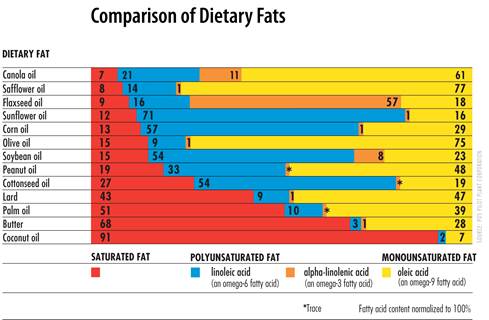
4. Leaner bodies, less heart disease and diabetes risk |

![]() Researchers at The Ohio State University found that men and women with higher linoleic acid levels tended to have less heart-threatening fat nestled between their vital organs, more lean body mass and less inflammation.
Researchers at The Ohio State University found that men and women with higher linoleic acid levels tended to have less heart-threatening fat nestled between their vital organs, more lean body mass and less inflammation.
![]() Higher linoleic acid levels also meant lower likelihood of insulin resistance, a precursor to diabetes. This finding could have obvious implications in preventing heart disease and diabetes, but also could be important for older adults because higher lean body mass can contribute to a longer life with more independence, said Ohio State's Martha Belury, a professor of human nutrition who led the research. The research appears online in the journal Molecular Nutrition & Food Research.
Higher linoleic acid levels also meant lower likelihood of insulin resistance, a precursor to diabetes. This finding could have obvious implications in preventing heart disease and diabetes, but also could be important for older adults because higher lean body mass can contribute to a longer life with more independence, said Ohio State's Martha Belury, a professor of human nutrition who led the research. The research appears online in the journal Molecular Nutrition & Food Research.
![]() The research team also looked at the health effects of oleic acid, found in olive oil and some other vegetable oils, as well as long-chain omega-3 fatty acids, found in fatty fish including salmon and tuna.
The research team also looked at the health effects of oleic acid, found in olive oil and some other vegetable oils, as well as long-chain omega-3 fatty acids, found in fatty fish including salmon and tuna.
![]() Though inflammation decreased as blood levels of those fatty acids rose, higher levels of oleic acid or long-chain omega-3s did not appear to have any relationship to body composition or signs of decreased diabetes risk despite longstanding recommendations that people eat more of these "healthy" fats.
There's been a pronounced shift in the last five years, she said, and
Though inflammation decreased as blood levels of those fatty acids rose, higher levels of oleic acid or long-chain omega-3s did not appear to have any relationship to body composition or signs of decreased diabetes risk despite longstanding recommendations that people eat more of these "healthy" fats.
There's been a pronounced shift in the last five years, she said, and
![]() it is linked to the push against trans fats. When linoleic acid is made solid (hydrogenated) for processed foods, it is more likely to convert to trans fats than its oleic cousin. So oils, notably safflower, sunflower and soybean, now routinely contain less linoleic acid -- it often makes up less than 20 percent of the fatty acids in commonly purchased oils, based on food labels and confirmed by testing in lab, Belury said.
it is linked to the push against trans fats. When linoleic acid is made solid (hydrogenated) for processed foods, it is more likely to convert to trans fats than its oleic cousin. So oils, notably safflower, sunflower and soybean, now routinely contain less linoleic acid -- it often makes up less than 20 percent of the fatty acids in commonly purchased oils, based on food labels and confirmed by testing in lab, Belury said.
![]() Grapeseed oil for now remains an excellent source of linoleic acid, which constitutes about 80 percent of its fatty acids, she said. Corn oil also remains a decent source, she said.
The team used data from two previous studies that focused on stress and included 139 people. In those studies, researchers assessed body composition using DXA scanning, an advanced way of measuring fat and muscle mass.
Grapeseed oil for now remains an excellent source of linoleic acid, which constitutes about 80 percent of its fatty acids, she said. Corn oil also remains a decent source, she said.
The team used data from two previous studies that focused on stress and included 139 people. In those studies, researchers assessed body composition using DXA scanning, an advanced way of measuring fat and muscle mass.
![]() They also evaluated the blood for insulin resistance and two markers of inflammation that are connected with disease.
Then they plotted results for each health category against the group's results for each of the three fat categories: linoleic acid, oleic acid and long-chain omega-3 fatty acids.
They also evaluated the blood for insulin resistance and two markers of inflammation that are connected with disease.
Then they plotted results for each health category against the group's results for each of the three fat categories: linoleic acid, oleic acid and long-chain omega-3 fatty acids.
For enquiries info@jothydev.net.
Please visit: jothydev.net | research.jothydev.com | diabscreenkerala.net | jothydev.com/newsletter
